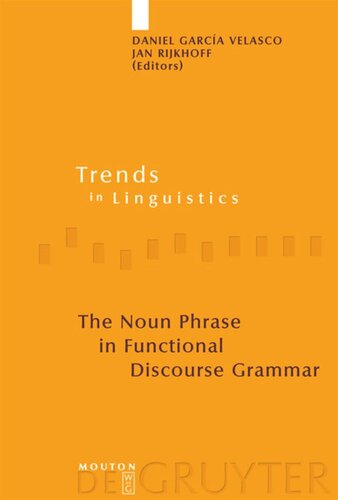

Most ebook files are in PDF format, so you can easily read them using various software such as Foxit Reader or directly on the Google Chrome browser.
Some ebook files are released by publishers in other formats such as .awz, .mobi, .epub, .fb2, etc. You may need to install specific software to read these formats on mobile/PC, such as Calibre.
Please read the tutorial at this link: https://ebookbell.com/faq
We offer FREE conversion to the popular formats you request; however, this may take some time. Therefore, right after payment, please email us, and we will try to provide the service as quickly as possible.
For some exceptional file formats or broken links (if any), please refrain from opening any disputes. Instead, email us first, and we will try to assist within a maximum of 6 hours.
EbookBell Team

4.3
58 reviewsThe articles in this volume analyse the noun phrase within the framework of Functional Discourse Grammar (FDG), the successor to Simon C. Dik's Functional Grammar. In its current form, FDG has an explicit top-down organization and distinguishes four hierarchically organized, interacting levels: (i) the interpersonal level (language as communicational process), (ii) the representational level (language as a carrier of content), (iii) the morphosyntactic level and (iv) the phonological level. Together they constitute the grammatical component, which in its turn interacts with a cognitive and a communicative component. This comprehensive approach to linguistic analysis is also reflected in this volume, which contains rich and substantial contributions concerning many different aspects of the noun phrase. At the same time, the analysis of a major linguistic construction from various perspectives is an excellent way to test a new model of grammar with regard to some of the standards of adequacy for linguistic theories.
The book contains several papers dealing with matters of representation and formalization of the noun phrase (the articles by Kees Hengeveld, José Luis González Escribano, Jan Rijkhoff and Evelien Keizer). Other contributors are more concerned with the practical application of the model with regard to discourse-interpersonal matters (Chris Butler, John H. Connolly), whereas the chapters by Dik Bakker and Roland Pfau and by Daniel García Velasco deal with morphosyntactic issues. In all, the variety of issues addressed and the range of languages considered prove that one of the important advantages of the FDG model is precisely the fact that grammatical phenomena can be treated from a semantic, pragmatic, morpho-syntactic, phonological or textual perspective in a coherent fashion.